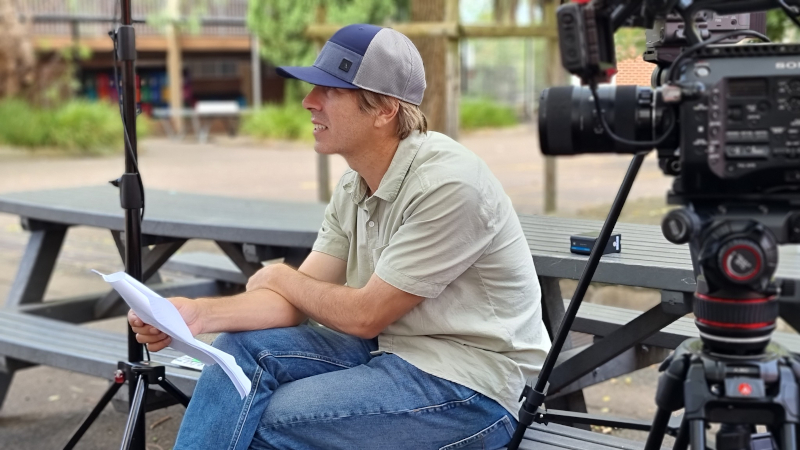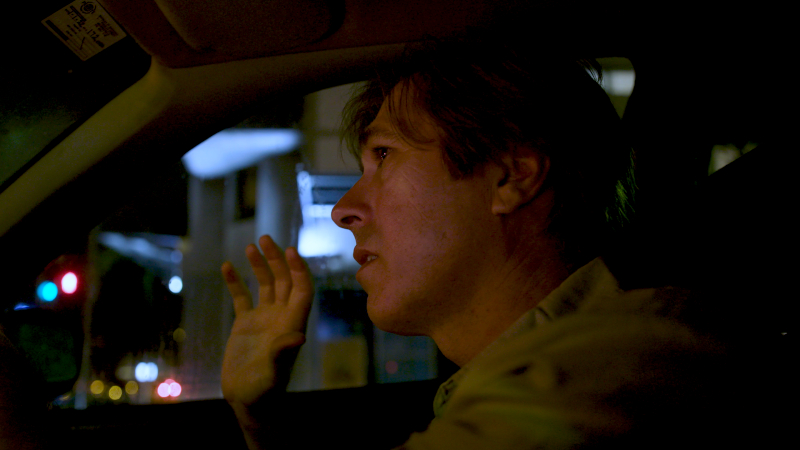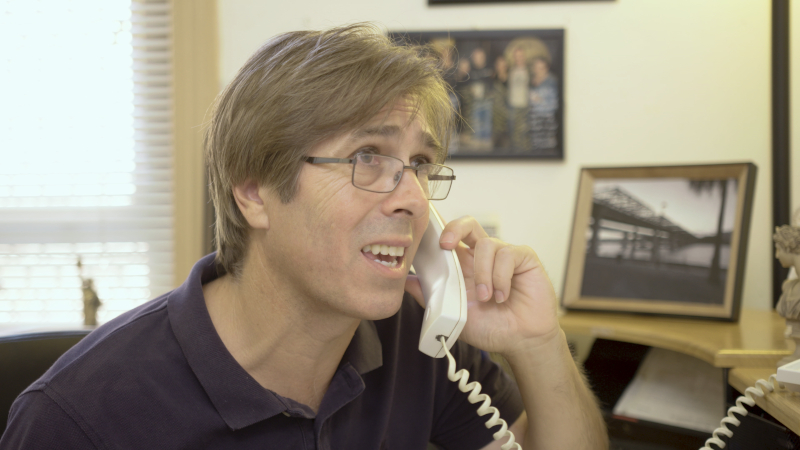Director – Alex Lykos – 2023 – Australia – Cert. 12 – 87m
***1/2
A man attempts to live for 30 days without the use of his smartphone, tablet or computer – out on digital from Monday, April 1st
This documentary opens with an advisory to keep your phone handy during the screening, as you may be required to use it at some point. In the UK, it’s only available on digital platforms… but even so, that advisory marks it out as different from most films.
Lykos, who narrates his documentary, is old enough to have grown up without a smartphone or other digital devices, but kids today handle smartphones from a younger and younger age. What would happen, wonders Alex, if I disconnected myself for an entire month? His and his wife’s home contains their two smartphones, two tablets, and a TV. Learning that Alex wakes and checks his smartphone three or four times a night, Alex’s doctor wires him for a sleep test.
Like many of us, Alex finds himself spending an hour on social media and wondering, what just happened? He and others admit to feelings of envy when others post about good things in their lives. A near-tearful divorcee talks about it being hard seeing people having a good time with partner or family.
Clinical psychiatrist Dr. Danielle Einstein emphasises the need to be able to talk about this or have the space to think it through, otherwise the resultant negative space can lead to depression.
Alex buys himself a digital alarm clock, an old school, rotary, landline phone and a “good, old-fashioned” Monopoly board game. There are problems with the landline as he would need to configure his data service provider, Australia’s National Broadcast Network (NBN) to use a landline phone: Unless you’re set up for this facility, you can’t simply plug it in.
He turns off his smartphone and tablet and puts them in the house safe. For the next 30 days, his only allowed screen will be the TV.

Day one. He sits on the loo (mercifully there’s a wall – we only see head and knees) without checking for the morning’s news, social media updates of friends and sports results. He buys and reads a paper – he sticks out like a sore thumb on the train, where everyone else is checking their mobile phones.
In Bolivia, which has a history of mining minerals for use in first world countries, those miners can be as young as six, and life expectancy 40 years. People are risking their lives so we can read sports results on the toilet.
“We are separated from the history of the things we use,” says an anonymous interviewee, “we don’t think about how it’s made”. His comments on our separation from the way things we use are made, our obliviousness to the processes and injustices involved, are spot on.
Danielle Einstein explains that it’s important to give attention to people. e.g. as a parent to your child, so that they feel they are valued. “You need to show you value me more than you value your smartphone or the network of people on it.”
Alex runs into problems with his wife and his dad trying to get hold of him. He doesn’t really miss the social media aspect at all. His dad (Greek, speaking Greek on the phone) wants him to get a “real job”, an admonition that will be familiar to anyone involved in the arts. He worries he missed an important message, and is aware his phone is how he normally picks up the news.
His wife halts playing Monopoly to send a smartphone message. Dr. Danielle Einstein explains the phenomenon of phubbing – or phone snubbing, when a partner would rather spend time on their phone than with their partner.
One week in, Alex has problems paying the film crew when the bank sends a security code to his smartphone to verify it’s him; he has to get his wife to sort it out with her phone. He starts doing things he’s not done for years – like playing golf.
Digital, Social and Cultural Research academic Amanda Third talks about smartphones in the classroom. They might improve learning, but can easily distract; many think they should be banned. Cue animated social media platform logos singing a ditty bemoaning that if socials were banned in schools, the companies would lose a lot of advertising revenue as their considerable reach to teenagers would be curtailed.
Without a smartphone, teenagers are outside their peers’ social loop. Meta’s commissioned internal research shows that social media has made body image issues worse or one in three teenage girls around the world. Teens on social media interact with AI about four times as much as adults, according to Dr. Catriona Wallace, founder, Responsible Metaverse Alliance. Lykos cites Facebook approving a pro-anorexia message targeted at teenage girls. Such things can often lead to depression among the target audience. Introverted teenager Angelina opens up about bullying, which started when she was in primary school, and the bullies would take their bullying of her to social media.
Should governments regulate social media use, similar to alcohol, cigarettes and gambling?

By Day 17, Alex is struggling. He enters an area snarled up by a traffic accident through lack of satnav. Smartphones are good things which can help make our lives easier, and without access to it, he’s struggling. Ubu, a teenager who traded in his smartphone for a flippy (teen speak for a flipper phone) talks about how he feels better without it – his attention span has gone up.
By Day 20, Alex has got himself an old clam phone so that his dad, his wife, and members of the crew can reach him, even though he knows this is (sort of) cheating.
Are smartphones the first step in our transforming into cyborgs? Catriona Wallace talks about brain chip transplants to enhance the human brain. Transhumanism is where software becomes part of our brain and our evolution. Cyborg Artist Neil Harbisson has an antenna planted in his head (like a Dalek!) to help him experience colour, although he is colour-blind. Are we approaching a state where technology and human flesh merge, and we evolve into something new? This sounds to this writer like the New Flesh of David Cronenberg movies.
According to technology specialist Timothy Stackpool, there’s less danger of machines taking over than there is of authoritarian governments using them to try and take over. He cites a need for international regulation just as current exists for, for example, chemical weapons, to prevent the use of AI as unstoppable, mindless killing machines.
Lethal Autonomous Weapons are weapons able to select and attack targets without any human intervention. Catriona Wallace says that while the chance of human extinction by climate change is one in a thousand, the chance of human extinction by AI is one in ten.
By Day 30, Alex is reunited with his technology and feels it’s invaluable, but that now he is controlling it rather than it controlling him. He also wonders whether humanity needs to take a long, hard look at technology to make sure we get the balance right. Finally, he notes that from 2024, smartphones are to be banned in Australian schools.
The film basically takes the Super Size Me (Morgan Spurlock, 2004) model (a man eats junk food for 30 days to see what it will do to him) and works it in reverse (a man detoxes from something for 30 days to see what happens if he tries to live without it, in this instance his smartphone, laptop and computer). This cottage industry production of may not be incredible cinema, yet it touches on some important issues and hopefully acts as a discussion starter, which makes it worth seeking out.
Disconnect Me is out on digital from Monday, April 1st.
Trailer:
